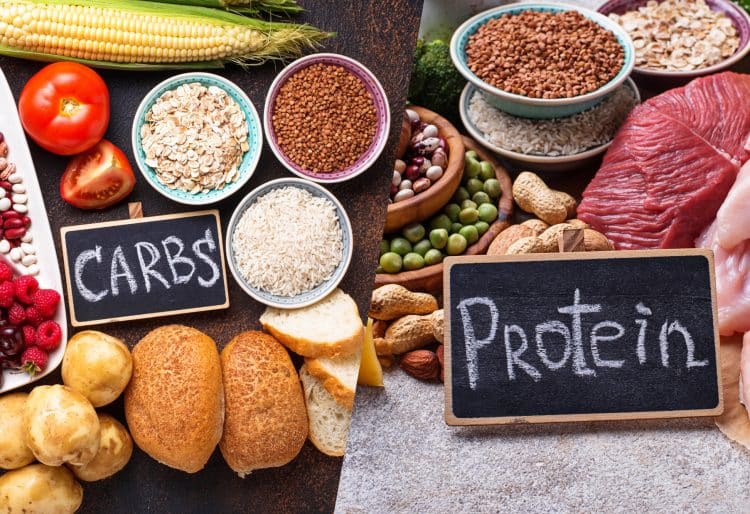In today’s day and age, obesity is a widespread problem, especially in men. According to the 2017–2018 data from the National Health and Nutrition Examination Survey, 34.1% of men are overweight, with 43% being obese and 6.9% suffering from severe obesity [1]. People dealing with weight issues must change their lifestyle. However, most men are undecided about where and how to start losing weight and which diet style to follow. Worry not, as we bring you the science of intermittent fasting, which has been proven effective in weight loss.
Fasting was always a part of our ancestors’ life. In the hunter-gatherer age, there were periods when the game was plentiful, followed by extended periods when our ancestors had to fast because of a lack of food. Because of this, our bodies are inherently equipped to undergo fasts. Fasting is a religious practice, too.
So, what is intermittent fasting?
Will This Break Your Fast?
Find out if coffee, tea, sweeteners, and other drinks break your fast based on your specific fasting goals.
Check What Breaks My Fast →It is a diet plan where you must fast for a specific period, known as the fasting window. This is followed by a period when you can eat normally, known as the feeding window. There are numerous benefits of intermittent fasting, the most exciting among them being weight loss. For those struggling with weight issues, intermittent fasting is a godsend.
Intermittent fasting is of many kinds. If you are a beginner, start with 12/12 fasting (fasting for 12 hours and eating in a 12-hour window). Then, you can move to 16/8 fasting (16-hour fast and eight-hour feeding window). If you feel that your body can handle fasts well, you could move on to more advanced intermittent fasting routines like the 5:2 fast (eat normally for five days and restrict calorie intake to 500-600 calories for two non-consecutive days in a week), alternate day fast (fasting for an entire day followed by a day of normal calorie consumption), and the 36 hours fast (self-explanatory) also known as the monk fast.
One crucial condition during intermittent fasting is that you cannot consume calories during the fasting window. It is okay to have water as it has zero calories. However, some intermittent fasting experts say having bone broth, MCT oil, or coffee (without sugar) is acceptable until the calorie count is below 50.
Unhealthy Lifestyle’s Impact on Weight
Genetics and sex play essential roles in determining body weight. However, an unhealthy lifestyle is also a significant factor in weight gain. Lifestyle choices like alcohol consumption, smoking, negligible physical activity, and poor sleeping patterns also lead to weight gain in the long run.
Science Behind Weight Loss with Intermittent Fasting
Here’s how intermittent fasting induces weight loss. When you eat normally, say four meals a day, you are usually in a calorie surplus where carbohydrates are converted to glucose and stored as fat. During normal eating, your body does not get the opportunity to break down fat reserves so that you lose weight.
During intermittent fasting, you must abstain from calorie consumption for an extended period. This can result in a calorie deficit. All the glucose gets expended, and the body looks for a new energy source. Now, the liver steps into the picture. It starts to produce chemicals known as ketones, which interact with the fat stores, breaking them down to produce energy. This process is called ketosis. When your body burns fat as fuel, you lose weight.
What Does Research Say About Weight Loss with Intermittent Fasting?
Intermittent fasting is becoming increasingly popular, and its effectiveness in losing weight is well supported by extensive research conducted by Krista Varady of UIC. She is a professor of nutrition and kinesiology and has conducted trials on different intermittent fasting versions like time-restricted eating and alternate-day fasting.
Overall, her research has concluded that intermittent fasting is as good as, if not better than, calorie counting when it comes to weight loss. With intermittent fasting, a person can expect to lose an average of 3-8% of their baseline weight (dependent on the kind of fast they follow).
Varady says,
“People love intermittent fasting because it’s easy. They need to find diets that they can stick to in the long term, and intermittent fasting is especially effective for weight loss and has gained popularity because no special foods or apps are necessary.”
Here are some of the highlights from the many research papers she has published:
Time-restricted feeding with a four or six-hour window will cut calories and also lead to weight loss
In this study, researchers tracked people restricting their eating to only four and six hours daily. After 10 weeks, both the group’s participants had reduced their daily caloric intake by 550 calories and lost 3% of their body weight. [2]
Time-restricted feeding works just as well as calorie counting for weight loss
In this study, the participants were requested to eat between 12 noon and 8 pm daily or cut caloric intake by 25%. After 12 months, both groups had lost roughly the same weight, suggesting that time-restricted feeding works as effectively as calorie counting when it comes to weight loss. [3]
Time-restricted feeding is effective for obese people
There was a study conducted on 23 obese volunteers that looked at what would happen if the participants consumed food only between 10 a.m. and 6 p.m. for 12 weeks. They were, however, allowed to eat whatever they wanted in their feeding windows. It was found that, on average, the participants consumed about 350 fewer calories and lost 3% of their body weight. [4]
What Does This Research Finding Mean for You?
If we factor in the effects of energy expenditure and physical exercises on weight loss, we can claim with a fair degree of certainty that intermittent fasting is a very effective tool for losing weight. But the trick to losing weight is achieving a calorie deficit. This is easier with intermittent fasting, regular physical exercises (resistance training and cardio), and calorie restriction.
Combining intermittent fasting with calorie restriction will give you excellent results. If you can sustain this regularly, you will see modest weight loss (3% to 8% of body weight as per current data). It will also benefit you with improvements in markers of cardiometabolic health, like LDL cholesterol, blood pressure, triglyceride levels, and moderate blood sugar.
However, if you follow the time-restricted feeding pattern but gorge yourself in your feeding windows, the weight loss strategy will not work. On the contrary, you will end up gaining weight! You must pay attention to the quantity and the quality of food you eat.
One downside of intermittent fasting is that it sometimes results in losing lean muscle mass. Lean muscle mass is important for maintaining your metabolic rate, regulating blood sugar, and keeping you physically healthy. You must pair intermittent fasting with resistance training to maintain your body’s lean muscle mass.
Another thing that you have to do to maintain your lean muscle mass is to increase your protein intake on the days that you are not fasting. While reducing calorie intake by 30-40%, you should increase your protein intake to 0.55–1.4 grams per pound of body weight.
To maximize protein absorption, you must space protein intake evenly through the non-fasting days. Include varied protein sources like eggs, poultry, fish, and dairy products in your meals for the best results.
Intermittent Fasting Weight Loss Plateau
With intermittent fasting, you will lose 5-10% of your body weight in 4–6 weeks, given you maintain a calorie deficit of at least 500 calories daily. This weight loss is due to the loss of stored water released in the first few weeks. You will experience a weight loss plateau where your weight remains unchanged for some time. If you can push past, your body will start metabolizing fat for energy, leading to a continuation of weight loss. [2]
When your body is in the weight loss plateau, do not think intermittent fasting is not working for you. This stage only implies that you need some time for your body to readjust and reset itself. Your body tends towards homeostasis (a stable state process), and there is a preset point for the weight of your body. [3]
After the initial weight loss, your body will strive to stay within a set point to function optimally. The fasting plateau will allow your body to reset to a lower weight. Do not run out of patience; give it a little time, and your body will go past the weight loss plateau, and you will continue to lose weight.
What is Dirty Fasting?
Intermittent fasting and “dirty fasting” are a bit different. While in intermittent fasting, you do not consume any calories in the fasting window, in dirty fasting, you are allowed to have diet soda, coffee and cream, MCT oil, and bone broth, provided that you do not ingest more than 50 calories.
If you add a sweetener, it will signal the pancreas to produce insulin, and increased insulin levels will stop your body from getting to burning fat for fuel. [4]
If you want weight loss, avoid dirty fasting and opt for a clean fast with only water.
Carb-Loaded and Protein-Loaded Diet Drawbacks
Consuming a high-carb diet might lead you to a plateau, which might last for a prolonged period. [5]
Eating a lot of carbs means excess sugar in your system, and your body will utilize sugar for energy instead of desired fat targeting. [6]
Along with carbs, excess protein in your diet will also cause problems with weight loss. Although lean protein does not raise blood sugar as much as carbs, it still does. When insulin gets released, it prevents your body from burning fat stores for fuel. Go for moderate protein consumption if you want good results with weight loss while intermittent fasting.
Effect of Low-Calorie Diet and Wrong Breakfast
While you restrict calorie intake to the feeding windows in intermittent fasting, if you drastically cut down on calories below the recommended amount, it will be counterproductive and counterintuitive for your body. When you do so, your body gets the signal to go into energy-saving mode, earmarking energy expenditure for crucial bodily functions, and will not target fat for energy conversion. [7]
While intermittent fasting for weight loss, your breakfast should exclude refined food and concentrate on complex carbs instead of simple carbs. Remember not to gorge at breakfast, or your weight loss efforts will fail. If you have the right balance at breakfast, hunger pangs will be a thing of the past, and you will not experience adverse side effects like vomiting and diarrhea.
Difference in Men’s and Women’s Metabolisms
Metabolism is the process where consumed food is broken down into micronutrients that the body can absorb. Metabolism is a constant process and even occurs when you rest, burning calories to keep the heart pumping and the lungs functional and ensuring that the different organs in your body work optimally.
Men have a higher rate of metabolism compared to women. This is because hormones in men tend to concentrate on lean muscle mass. For men, it takes more energy to maintain their muscle mass. Hence, men usually burn more energy while intermittent fasting than women.
If you are a man and want to coax your body to lose weight, you must aim for a high degree of metabolism by concentrating on healthy eating, plenty of exercise, and intermittent fasting.
Importance of Exercise in Weight Loss While Intermittent Fasting
You must exercise if you desire fast weight loss results while intermittent fasting. For weight loss, you must be in a calorie deficit. This can be done by exercising and/or consuming fewer calories than you expend. You can accelerate weight loss by doing low-moderate intensity workouts in the fasting windows. Incorporate resistance training 3-4 times a week for best results.
High-intensity interval training (HIIT) is particularly useful for weight loss with fasting. This form of exercise has alternate periods of intense effort and rest. HIIT workouts are normally done with cardio exercises like rowing, cycling, or running. Go for what suits you.
Intermittent Fasting and Testosterone
Both men and women produce testosterone, but men have much more significant amounts of it, while women have negligible amounts. Testosterone is responsible for many male characteristics like testes development, sex drive or libido, increased bone strength and development of muscles, imparting a deep voice, and facial and body hair development.
If testosterone levels drop in a man, it may cause a loss of muscle, increased percentage of body fat, and other side effects. Low levels of testosterone could potentially increase the risk of stroke, type 2 diabetes, as well as heart disease.
In men, intermittent fasting leads to a rise in Leutenizing Hormone (LH) levels. LH is responsible for stimulating testosterone production. With a rise in LH levels, your testosterone levels also rise. If you do intermittent fasting, your LH levels can increase by as much as 67%, causing a boost of 180% in testosterone levels.
Loss of Muscle Mass in Men While Intermittent Fasting
Men’s chances of losing muscle mass while intermittent fasting are lower than while following other weight loss programs. Intermittent fasting can result in body recomposition, where the body fat percentage is decreased along with an increase in muscle mass percentage.
If you are keen not to lose muscle mass along with fat while intermittent fasting, you must increase your protein intake on the non-fasting days. A 30-40% decrease in calories and a moderate increase in protein intake will usually do the trick.
It will help if your protein intake is distributed throughout the day, as it maximizes protein absorption. Eat a wide variety of protein-loaded foods like eggs, fish, poultry, and dairy products.
FAQ’s
How quickly can I lose weight with intermittent fasting?
A systematic review of 40 studies on intermittent fasting found that it brought about weight loss of 7-11 pounds over 10 weeks.
Will I need to do intermittent fasting every day?
You can lose weight by following any intermittent fasting method. These methods range from a daily fast to fasting every alternate day to fasting twice weekly. Take your pick.
Is intermittent fasting for everyone?
While intermittent fasting is safe for most people, it is not recommended for specific conditions. Pregnant and breastfeeding women should stay away from it. If you have kidney stones or liver disease, take meds with food, or have diabetes and other chronic diseases, avoid intermittent fasting.
Is intermittent fasting healthy in the long run?
We need more scientific data to prove this. It is unclear if there are long-term risks or benefits attached to intermittent fasting. Do get a doctor’s opinion before you start doing it.
Conclusion
If you have been wondering how to lose weight but are still looking for success with popular diets, intermittent fasting may be just what you need. By practicing intermittent fasting, you can lose excess and unwanted body fat and improve your overall health.
In addition to weight loss, fasting fights high blood sugar, lowers insulin resistance, improves markers of coronary disease, possibly prevents cancer, and even can help reverse mental health problems like Parkinson’s and Alzheimer’s.
References
Fitness Volt is committed to providing our readers with science-based information. We use only credible and peer-reviewed sources to support the information we share in our articles.
- Overweight & Obesity Statistics. (2023, June 8). National Institute of Diabetes and Digestive and Kidney Diseases.
- Cienfuegos, Gabel, Kalam, Ezpeleta, Wiseman, Pavlou, Lin, Lima Oliveira, & Varady . (2020, July 15). Effects of 4- and 6-h Time-Restricted Feeding on Weight and Cardiometabolic Health: A Randomized Controlled Trial in Adults with Obesity. cell.com. Retrieved September 16, 2023
- Shuhao Lin, Sofia Cienfuegos, Mark Ezpeleta, et al. Time-Restricted Eating Without Calorie Counting for Weight Loss in a Racially Diverse Population: A Randomized Controlled Trial. Ann Intern Med.2023;176:885-895. [Epub 27 June 2023]. doi:10.7326/M23-0052
- Gabel, K., Hoddy, K. K., Haggerty, N., Song, J., Kroeger, C. M., Trepanowski, J. F., Panda, S., & Varady, K. A. (2018, June 15). Effects of 8-hour time restricted feeding on body weight and metabolic disease risk factors in obese adults: A pilot study. Nutrition and Healthy Aging; IOS Press.
- Anton, S. D., Moehl, K., Donahoo, W. T., Marosi, K., Lee, S., G. Mainous, I. A., Leeuwenburgh, C., & Mattson, M. P. (2017, October 31). Flipping the Metabolic Switch: Understanding and Applying Health Benefits of Fasting. PubMed Central (PMC).
- Müller, M. J., Bosy-Westphal, A., & Heymsfield, S. B. (2010, August 9). Is there evidence for a set point that regulates human body weight? PubMed Central (PMC).
- Dhillon, J., Lee, J. Y., & Mattes, R. D. (2017, September 9). The Cephalic Phase Insulin Response to Nutritive and Low-Calorie Sweeteners in Solid and Beverage Form. PubMed Central (PMC).
- Effects of fasting on insulin action and glucose kinetics in lean and obese men and women – PubMed. (2007, October 1). PubMed.
- Effect of a low-carbohydrate diet on appetite, blood glucose levels, and insulin resistance in obese patients with type 2 diabetes – PubMed. (2005, March 15). PubMed.
- Benton, D., & Young, H. A. (2017, June 28). Reducing Calorie Intake May Not Help You Lose Body Weight. PubMed Central (PMC).
Article Updates Timeline:
Our editorial team experts constantly update the articles with new information & research, ensuring you always have access to the latest and most reliable information.
December 27, 2023
Updated By
Dr. Rashmi Byakodi
Fact Checked By
Dr. Malik
September 17, 2023
Written By
Dr. Rashmi Byakodi
Edited By
Vidur Saini
Tip: If you're signed in to Google, tap Follow.














This is a very good article on IF. I started doing it over 12 years ago when I quit cigarette smoking. It helped keep me from gaining weight after quiting. I stil do IF today. Thank you for an excellent article!